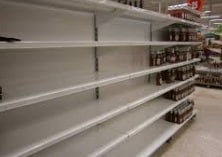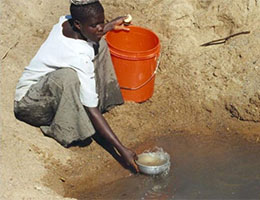 Scarcity is the lack or insufficiency of something . When an element is scarce, it is little or meager. For example : “The strike of bank workers generated a shortage of cash in the city” , “The shortage of certain remedies could cause a humanitarian crisis in the South American country” , “There is a shortage of vegetables due to the floods that affect the central region of the province .
Scarcity is the lack or insufficiency of something . When an element is scarce, it is little or meager. For example : “The strike of bank workers generated a shortage of cash in the city” , “The shortage of certain remedies could cause a humanitarian crisis in the South American country” , “There is a shortage of vegetables due to the floods that affect the central region of the province .
If we consider the first example, we will notice that the “cash shortage” refers to the lack of bills and coins in circulation, in this case due to a union conflict. When banks are closed and ATMs are not replenished, cash can be scarce. As for the second example, if there is a lack of drugs to treat diseases and health disorders, it is possible that the situation could lead to a serious crisis. Finally, the third example refers to a “vegetable shortage” caused by climatic conditions that harm crops.
In its most general sense, the idea of scarcity is linked to the absence of resources to satisfy basic needs . Those who live in scarcity, in this sense, lack access to food, drinking water, energy, etc., and therefore cannot develop adequately in society.
In general, there is no society that has all the necessary resources to support the needs of its people, but rather it must relate to others to carry out the exchange of goods and services. In a community, scarcity entails the obligation to prioritize the objectives and needs to be satisfied, so that there is order.
For economics , on the other hand, scarcity is a consequence of the imbalance between people's unlimited needs and the limited means to satisfy them . In this case, scarce should not be thought of as a synonym for insufficient but as the description of a resource that cannot be used in an unlimited way, and that requires effort, time, capital and organization to obtain and maintain it.
 In other words, this meaning of scarcity is not related to technology but to the imbalance that occurs between the needs and desires of individuals and the means they have at their disposal to make them come true: there is an unlimited number of human needs. that must be satisfied with a limited number of economic resources.
In other words, this meaning of scarcity is not related to technology but to the imbalance that occurs between the needs and desires of individuals and the means they have at their disposal to make them come true: there is an unlimited number of human needs. that must be satisfied with a limited number of economic resources.
There is also talk of scarcity due to accumulation or inequality , in those cases in which there is a reduced amount of resources in only some portion of society. A situation of this type has two sides, since while one party experiences a lack of resources, the other benefits from an abundance . This can occur at a national or regional level, or even in smaller social groups.
The Spanish economist David Anisi explains in his work Creators of Scarcity. From well-being to fear that when economic power predominates over others that tend to attenuate or regulate it, it is necessary to find markets of scarcity : it is about creating unemployment to reduce salaries and make certain resources such as healthcare too expensive or inaccessible, security and education for a large part of the community.
If we focus on the game of supply and demand, the scarcity of a good can be due to the depletion of a resource or an increase in demand. In the first group we find alterations in the production process for reasons of major cause; in the second, overpopulation and the increase in capital power per individual. For example, a bakery that produces 50 kilograms of bread per day and registers a demand of 80 kilograms per day will have a shortage situation before the end of each day.
